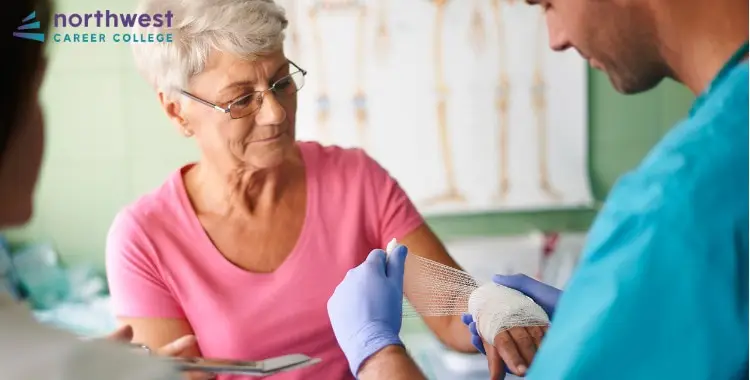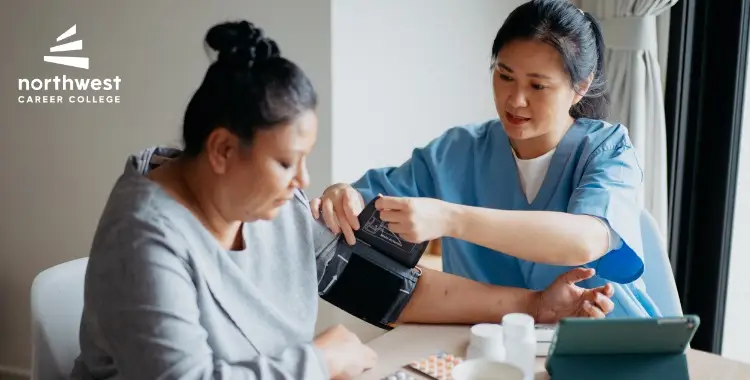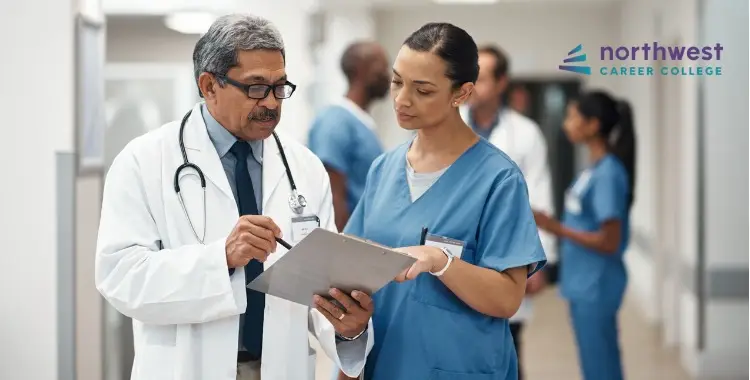The Medical Assistant’s Role in Patient Education
- Medical Assistant
- July 2, 2024
- 3.1k views
- 5 min read

Table of Contents
Empowering Wellness Through Knowledge
For current or aspiring medical assistants, understanding the significance of patient education is critical in providing exceptional care. Healthcare professionals’ willingness to invest time in patient education makes a significant impact on the patient experience and long-term health outcomes.
This article delves into why patient education delivered in medical settings is so important and how medical assistants can actively contribute to this crucial aspect of healthcare after graduating from medical assistant schools.
Understanding the Fundamentals: What is Patient Education?
It is generally understood that licensed healthcare providers like physicians, physician assistants, and nurse practitioners are primarily responsible for explaining diagnoses and treatment plans to patients. However, given that medical assistants typically spend the most time with patients in a medical office, they are often ultimately responsible for re-explaining or reinforcing the message delivered by the provider.
Patients are often too nervous to ask questions of the provider or overwhelmed and cannot even think of their questions until after the provider leaves. In other cases, patients find healthcare providers difficult to relate to and they want these concepts explained in simpler terms by the medical staff.
Patient education offered by medical assistants primarily focuses on explaining anatomy, physiology, and pathology concepts related to a medical diagnosis; the preparation for and recovery from various medical procedures recommended by the provider; and how tests, medications, and procedures fit together as the steps of a multi-stage treatment plan.
At times, medical assistants may also educate patients on fundamental principles like the importance of medication adherence, lifestyle modifications recommended by the provider, or more technical concepts such as the rationale behind specific treatment procedures or diagnostic tests.
More recently, educating about health and wellness concepts (i.e. disease prevention) has been identified as a significant area of opportunity for the entire healthcare industry, as it is more beneficial for patients and cost-effective for the overall system if we can offer health coaching and early intervention rather than waiting until significant medical intervention is needed.
Patients feel more engaged and confident in their healthcare journey when they comprehend the information provided, and medical assistants are often the best medical professionals to engage patients in this manner.
Read More: The History of Medical Assistant
Patient Education Supports Informed Consent
Informed consent is a cornerstone of medical ethics. The concept of “informed consent” requires healthcare providers to ensure patients understand the nature of their condition, treatment options, and potential risks before consenting to a treatment plan.
All of us have an inherent understanding of why this concept is so important…healthcare is a deeply personal experience, therefore patients need to be able to make decisions about the sort of care they want to receive.
Patient education is instrumental in obtaining informed consent, fostering trust, and promoting patient autonomy. Moreover, well-informed patients are more likely to adhere to prescribed treatments, leading to better health outcomes. Adequate patient education also reduces liability risks and enhances patient satisfaction with the healthcare experience.
Considering the significant role that patient education efforts play in ensuring that informed consent is maintained as a consistent standard in medical offices across the country, it should be no surprise that training programs for medical assistants are placing an increasing emphasis on this skill as one of the core competencies for their graduates.
How do Medical Assistants Educate Patients?
Patient education begins even before the medical examination, often through informative displays, brochures, or digital presentations in the waiting area. These aids not only engage patients but also serve as educational tools.
Through active listening and clear communication during the patient intake process (i.e. when collecting the patient’s medical history and chief complaint), medical assistants should identify areas of opportunity to educate patients about their current condition.
After the provider has completed the examination, identified a diagnosis, recommended a treatment plan (if appropriate), and explained this information to the patient, the medical assistant must then actively engage patients, encouraging them to express their understanding of the diagnosis and treatment plan. At that time, they can address patient concerns, correct misconceptions, and provide supplementary information using visual aids, diagrams, or relevant medical literature.
How Patient Education Leads to Better Health
When patients understand their conditions (i.e. the diagnosis) and treatment plans (including procedures, medications, and lifestyle changes), they are more likely to adhere to medical advice, adopt healthier behaviors, and experience better overall health.
Additionally, patients demonstrate higher levels of satisfaction when medical assistants take the time to explain important medical information to them. Patients report feeling supported in their healthcare journey when given the appropriate time and attention.
Through these two mechanisms, medical assistants can help empower patients to take control of their health, leading to enhanced well-being, reduced healthcare disparities, and better systemic health outcomes.
Conclusion: Patient Education is a Medical Assistant’s Mission
In conclusion, medical assistants are pivotal in patient education, contributing to better health outcomes and patient satisfaction. All medical assistants must prioritize patient education to empower their patients and do their part to build a more trusting and collaborative healthcare system for our communities.





